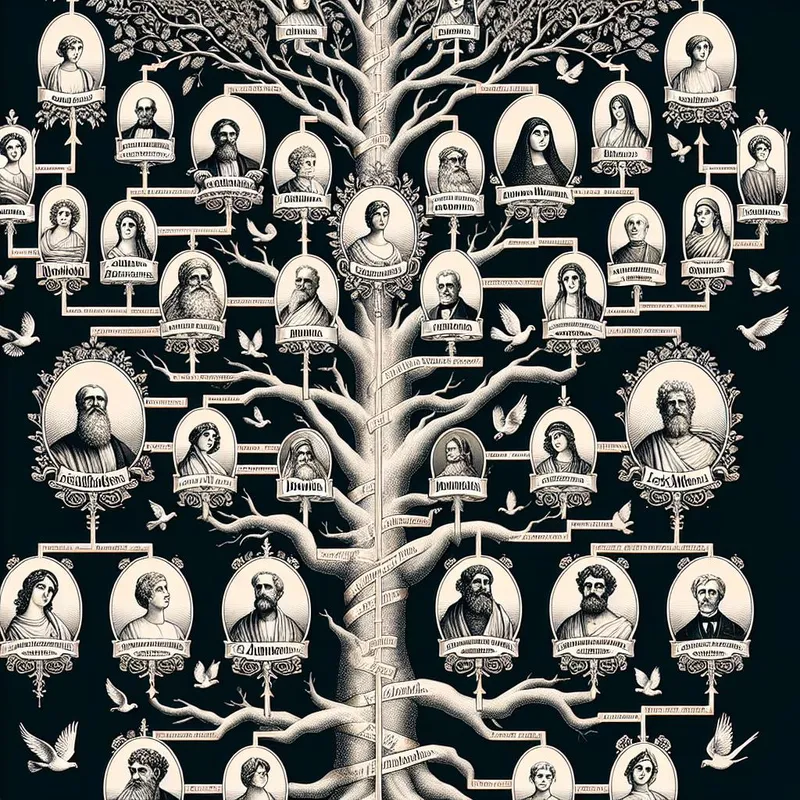
"Unveiling the Divine Lineage: Exploring Jesus' Genealogy in Depth"
Posted on 22 May 2024
Jesus' Genealogy: Tracing the Lineage of Jesus
Jesus’ genealogy is an important aspect of understanding His identity and fulfilling the Messianic prophecies. The genealogies of Jesus are recorded in two places in Scripture: Matthew 1 and Luke 3:23-38. While both genealogies trace the lineage of Jesus, there are some significant differences between them.
1. Matthew's Genealogy: Tracing the Lineage from Abraham to Joseph
Matthew focuses on tracing the genealogy of Jesus from Abraham to Joseph. He highlights the legal lineage of Jesus through Joseph, who was the earthly father figure in Jesus' life. Matthew presents Joseph's father as Jacob and traces the line through David's son Solomon. It is important to note that Matthew's genealogy is primarily concerned with establishing Jesus' legal right to the throne of David.
2. Luke's Genealogy: Tracing the Lineage from Adam to Joseph
Luke, on the other hand, traces Jesus' genealogy from Adam to Joseph. Unlike Matthew, Luke does not focus on legal lineage but emphasizes Jesus' blood relationship with humanity as the Son of Man. In Luke's genealogy, he traces the line through David's son Nathan.
3. Differences and Commonalities in the Genealogies
When comparing the genealogies presented by Matthew and Luke, it becomes evident that they are distinct and appear to be tracing different lineages. The only common names shared between the two genealogies are Shealtiel and Zerubbabel. Even then, it is possible that these names refer to different individuals with the same names.
4. Possible Explanations for the Differences
One possible explanation for the differences lies in a concept known as "levirate marriage." According to this theory, held by church historian Eusebius, Melchi (Luke 3:24) and Matthan (Matthew 1:15) were married at different times to the same woman, tradition names her Estha. This would make Heli (Luke 3:23) and Jacob (Matthew 1:15) half-brothers. Heli, being childless, died, and his half-brother Jacob then married Heli's widow, who gave birth to Joseph. In this scenario, Joseph would be the "son of Heli" legally but the "son of Jacob" biologically.
Another explanation, supported by many conservative Bible scholars today, is that Luke is recording Mary's genealogy, while Matthew is recording Joseph's genealogy. According to this view, Matthew follows the legal lineage through Joseph, while Luke follows the bloodline through Mary. Since Joseph was Mary's husband, he was considered legally connected to her family and could be referred to as the "son of Heli."
5. The Significance of Jesus' Genealogy
Jesus' genealogy holds great significance in establishing His identity as the Messiah. Both Matthew and Luke trace Jesus' lineage back to King David, fulfilling the Messianic prophecies that the Messiah would come from David's lineage. Jesus' genealogy also establishes His connection to Abraham, fulfilling the promise made to Abraham that through his descendants, all nations would be blessed.
Why This Matters
Understanding Jesus' genealogy helps us grasp the fulfillment of Old Testament prophecies concerning the Messiah. It highlights Jesus' rightful place as the heir to David's throne and His connection to Abraham. Additionally, it demonstrates God's faithfulness in fulfilling His promises throughout history.
Think About It
- How does knowing Jesus' genealogy strengthen your understanding of His role as the Messiah?
- Consider the significance of Jesus being a descendant of David and Abraham. How does this impact your faith?
- Reflect on the different perspectives offered by Matthew and Luke's genealogies. How does this showcase the multi-dimensional nature of Jesus' identity as both fully human and fully divine?
In conclusion, the genealogies of Jesus in Matthew and Luke serve different purposes. Matthew focuses on establishing the legal lineage through Joseph, while Luke emphasizes the bloodline through Mary. Both genealogies reveal Jesus' connection to David and Abraham, fulfilling Messianic prophecies. Understanding Jesus' genealogy deepens our understanding of His identity and reaffirms God's faithfulness in fulfilling His promises throughout history.
